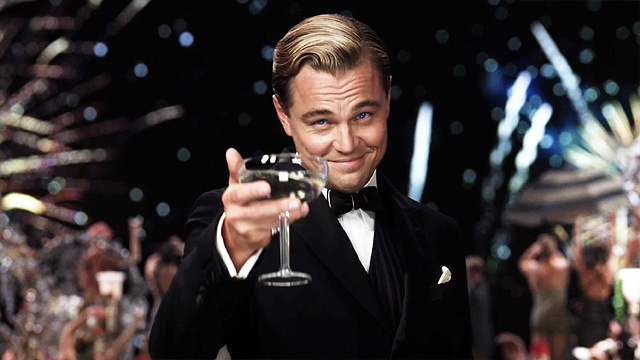Review: The Great Gatsby (2013)
F. Scott Fitzgerald’s The Great Gatsby is an ambivalent work. Baz Luhrmann’s film adaptation is successful because it retains and embodies the novel’s contradictions. Like the novel, the film is a splendid account of the Jazz Age, expressing the period’s boundless exuberance, but it also exposes the carelessness and decadence. As a romance, it reveals both the vitalizing and destructive aspects of idealized love. Most importantly, however, the viewer’s feelings for Jay Gatsby are still mixed. Gatsby is contemptible yet admirable, empty yet profound—for that is the dangerous, difficult, illusory nature of dreams, and none more so than the American dream.
In shaping an accessible film, Luhrmann and his co-writer Craig Pearce do make some changes. Nick Carraway (Tobey Maguire) still narrates, but Luhrmann and Pearce have devised the frame device of having Nick put the story together in a sanitarium. I agree with Rick Groen from The Globe and Mail that the sanitarium scenes create a believable setting for the highly elaborate narration. The film’s visualization of Nick as the narrator also draws attention to the narrative’s layers, reminding the viewer that one is watching Nick’s account of Gatsby. Throughout the film, Luhrmann also emphasizes Nick as a watcher, making him a voyeuristic surrogate for the audience as well as narrator. Maguire has a built a career out of playing sympathetic loners, and he embodies Nick well.
Leonardo DiCaprio was an excellent choice to play Gatsby. With a splashy entrance almost a third into the film, Gatsby is a star role if there ever was one. When we first see DiCaprio as Gatsby, I couldn’t help thinking that there probably isn’t another movie star at the moment who has enough presence, charm, and star status to play him. DiCaprio excels as Gatsby, always subtly communicating that Gatsby plays Gatsby. Carey Mulligan is effervescent as Daisy, Joel Edgerton is an intimidatingly physical Tom, and Elizabeth Debicki’s Jordan Baker is appropriately distant.
Luhrmann himself doesn’t fail to impress. The Jazz Age parties are infused with a flashy hip-hop aesthetic and beats, which, while obviously anachronistic, invests the twenties glitz with twenty-first century pull. Luhrmann uses the 3D camera very well, reminding us, as Scorsese did in Hugo, that there is much potential for the format beyond exploding objects flying at our faces. It’s fitting that a film about illusions literally projects a kind of façade. Matt Zoller Seitz has complained that the parties don’t feel like real parties, but isn’t that the point? They’re stupendous shows put on by Gatsby in the hopes of attracting Daisy, even if the attendees don’t know that and are really drunk. I think Joshua Rothman is more on track in his New Yorker essay titled “The Serious Superficiality of The Great Gatsby.” Luhrmann’s overkill conveys the decadence of the twenties. Too much is the right amount. The spectacle dazzles at the same time it draws attention to its artificiality.
With the film’s excessive indulgence in its visual luxuries and kinetic pleasures in mind, I want to add that The Great Gatsby is a welcome addition to the summer lineup. In many ways, it’s classical big-budget entertainment, hearkening back to the days when big movies were big not because they were part of some action-packed fantasy mega-franchise, but because they had big stars, high or middle-brow source material, and always impeccable and lavish production values. These qualities used to define Hollywood. Now we think of superheroes and ceaseless climactic escalation. So after the smash and tumble of Iron Man 3, it’s a pleasure to take in this total artwork. Every aspect adds to the total effect and pleasure—the cool anachronistic tunes, the swooping camerawork, the gorgeous fashion, the beautiful sets, the flagrantly artificial (in a good way) special effects, the fine acting, and, of course, the wonderful source material.
8 out of 10
The Great Gatsby (Australia/USA, 2013)
Directed by Baz Luhrmann; screenplay by Baz Luhrmann and Craig Pearce based on the novel by F. Scott Fitzgerald; starting Leonardo DiCaprio, Tobey Maguire, Carey Mulligan, Joel Edgerton, Elizabeth Debicki, Amitabh Bachchan, and Isla Fisher.
